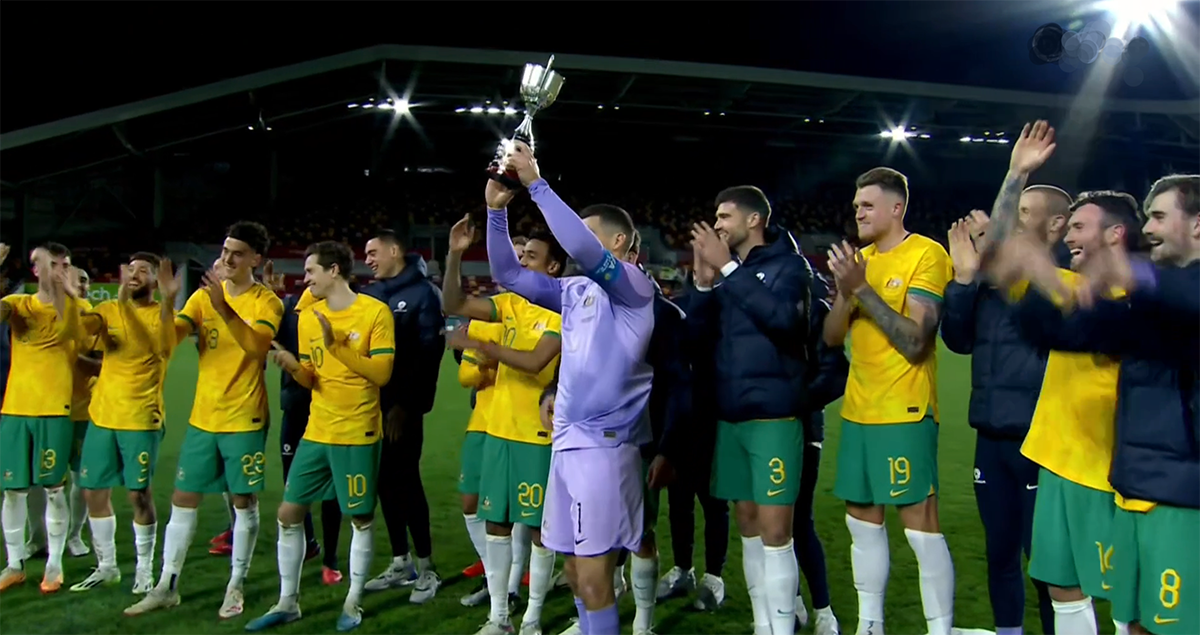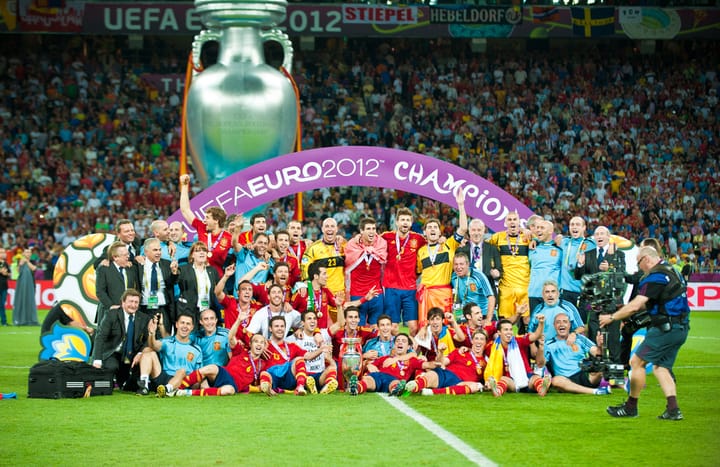The Rediscovered 100-year-old, Soccer Ashes Trophy Leads To A Trans Tasmania Clash in London
When sports aficionados think of Ashes, the mind instinctively drifts to the iconic cricket rivalry between England and Australia. But the Soccer Ashes has been deeply intertwined in the sporting tapestry between Australia and New Zealand. Let's have a look.

This October, the iconic Soccer Ashes trophy will be the center of attention as the
All Whites and Socceroos face off in London. The match holds special significance as it brings to the forefront a trophy that was believed to have been lost until its recent discovery earlier this year.
The cherished trophy - a meticulous wooden box made from a blend of
New Zealand rewarewa (honeysuckle) and Australian maple - captures the Trans Tasmania rivalry and the Anzac Memorial Day simultaneously. Anzac stands for Australia New Zealand Army Corps. The Day (April 25) broadly commemorates all Australians and New Zealanders "who served and died in all wars, conflicts, and peacekeeping operations" and "the contribution and suffering of all those who have served".
Anzac Day was originally devised to honor the soldiers who served in the Gallipoli campaign (1915) in the South of Italy. Private William Fisher was one of them. The silver-plated razor case he carried with him later became the container for the Anzac Soccer Ashes; a silver soccer ball surmounts the top of the lid, while the front panel bears a silver kangaroo in the center, with a silver fern leaf on each side, bearing the letters 'NZ' in blue enamel.
The Soccer Ashes were created after New Zealand defeated Australia in a series in 1923. The ashes inside belong to cigars enjoyed by the Australian captain, Alex Gibb, and New Zealand’s captain, George Campbell. New Zealand won 3-1 in Dunedin and claimed the Test series 2-0, with the prolific Cook scoring in every game. Despite William Maunder’s late goal clinching Australia’s first win at the Gabba in June 1923, New Zealand won the series 2-1.
"We are delighted to win the series," captain George Campbell said. "The team played in a manner which was irresistible." The pioneers did seem to have an eye on creating a legacy. After the 1923 series, Australian officials presented Campbell with an ‘Ashes’ trophy filled with the remains of cigars consumed by him and the Australian captain, Alex Gibb, burying the hatchet, prompted by a disagreement that federations of both countries had.
Ten years of silence followed.
Long-lost Anzac 'Soccer Ashes' Trophy Resurfaces after 69 Year
Australia comprehensively beat New Zealand in the Ashes series in 1933, 1936, 1948, and 1954. Australian football fell into disarray in 1957, with a faction of migrant clubs in New South Wales forming a rebel federation. They and the Australian Soccer Football Association were at loggerheads, culminating in ASFA being suspended in 1960 by football's governing body, FIFA.
Historians believe these events led to many of the traditions being forgotten. Internationals between Australia and New Zealand weren't a priority. New Zealand soccer historian Barry Smith believes that the trophies of Australia's old football body were probably of little interest once a new governing organization was formed in 1961, and the whereabouts of the Anzac Ashes trophy remains a mystery.
However, frequent test series for more than 30 years between the two Anzac nations, playing for a trophy that ‘witnessed’ action at Gallipoli and is inscribed with powerful cultural icons, seemed to be clear evidence of a deep and abiding relationship between soccer and the Anzac story. One wonders why this tradition died out in 1954 without ever stopping to marvel that it lasted as long as it did or ponder the mechanics of its gestation. Indeed, this is a vital question because even as Australian soccer’s quality, profile, and professionalism were starting to rise in the 1950s, the game’s connection with the Australian past and its status within legend and mythology was undergoing erasure.
The petite wooden trophy vanished mysteriously in 1954.
Gone.
No trace.
Until this year, nearly seven decades after its disappearance, the iconic artifact has been uncovered in pristine condition in a residential garage. During a house clearance of the late Australian Soccer Football Association chair, Sydney Storey, family members stumbled upon the commemorating piece in a garage. “Amid old containers, we came across this impeccably kept historical soccer trophy, which, to our astonishment, turned out to be the famed Anzac Soccer Ashes trophy,” shared Peter Storey. "Its unique engravings and
soccer ball motif immediately struck us. We sensed its importance, but the full
magnitude was yet to dawn on us."
Trevor Thompson, an acclaimed historian and author of 'Burning Ambition', a book charting the formation of the maiden Australia and New Zealand national teams, hailed the trophy as “potentially the most invaluable gem in domestic
football.” Thompson elaborated, “It embodies powerful symbols of the unity between the two nations, and the razor case, with its Gallipoli links, is a poignant reminder of their joint combat during WWI.”
Football Australia’s head, Chris Nikou, emphasized the trophy's pivotal role in commemorating and honoring Australia's football legacy. “Its history epitomizes the valiance and bond of the Anzacs, a spirit that’s rekindled every time Australia and New Zealand engage in sporting combat,” commented Nikou.
Reviving Traditions
As soon as the Ashes was refound, Andrew Pragnell, CEO of New Zealand Football, emphasized the game's significance in the trans-Tasman sporting narrative. He expressed the community's eagerness to witness this competition, particularly by reintroducing the Soccer Ashes trophy. He underscored the historical value and reflected on the sustained collaboration between New Zealand Football and Football Australia, remarking, “Our aligned efforts bolster football's development in the Asia Pacific, and our united front fortifies our leadership in the region."
Echoing Pragnell's sentiments, James Johnson, Football Australia
CEO admired the trophy's historical richness and the
intertwined tales leading to its recent discovery. He spoke of the deep
connection and shared football passion between Australia and New Zealand,
adding, “The trophy's creation laid the groundwork for our present-day
collaboration. The decision to reinstate it as the coveted prize for the
Socceroos and All Whites were unanimous.”
Save the date
The match on Tuesday 17 October 2023 in London (Brentsfords Gtech Community Stadium) will see the legendary trophy put on the line for the first time since 1954. The game is much anticipated for Darren Bazeley, All Whites' head coach, especially with such a distinguished prize at stake. He highlighted the game's importance in their preparation strategy for the FIFA World Cup 2026 qualifiers, adding, “We are eager to meet our Kiwi supporters in London.”
UPDATE






